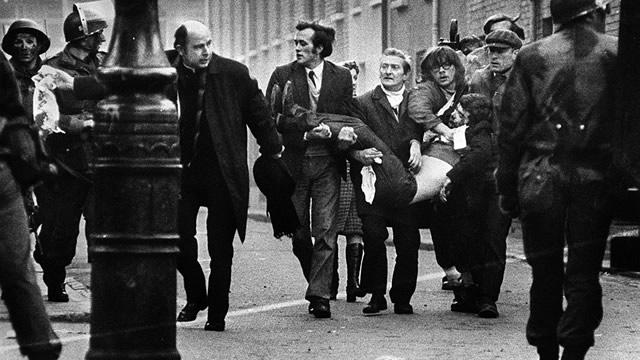
Report from the High Court in Belfast today, where Madden & Finucane represent the family of the late Patrick Campbell.
The family of a man shot in the back by a British soldier as he tried to run to safety on Bloody Sunday are to be awarded more than £160,000, a High Court judge ruled today.
Patrick Campbell was seriously injured and quit his work as a docker after the January 1972 gun attack in Derry which claimed the lives of 14 people.
The father-of-nine, who was aged 52 when hit by a bullet from a high velocity rifle fired by Lance Corporal F, died from cancer in 1985.
Mr Justice McAlinden held that his family should receive a payout of £163,048 from the Ministry of Defence (MoD) to cover loss of earnings and damages in the case.
The judge said: “The court has no hesitation in finding that the wrongful actions of the servants or agents of defendant on the day in question gave rise to emotions of extreme fear, if not terror, in the mind of the deceased.”
Members of the Parachute Regiment opened fire on civil rights demonstrators during the notorious events which came to be known as Bloody Sunday.
In 2010 the Saville Inquiry into the shootings established the innocence of all those killed and wounded.
Those findings led to the British Prime Minister at the time, David Cameron, issuing a public apology for the soldiers’ actions.
He described the Bloody Sunday killings as “unjustified and unjustifiable”.
More than £2m has already been paid out in settlements and awards made in other actions against the MoD on behalf of those bereaved or injured.
With liability accepted, proceedings brought by Mr Campbell’s family centred on a dispute over the level of compensation.
The court heard he was shot at relatively close range at the rear of the Rossville flats in Derry, falling to his knees as he tried to reach safety.
Counsel for the Campbell family claimed Lance Corporal F had acted liked it was a “turkey shoot”.
As the injured man was then being taken to hospital by car soldiers stopped the vehicle and removed him.
He was examined by an army doctor who then arranged for him to be transported in a military vehicle – an incident cited as typing the attitude of soldiers on the day.
With no exit wound, the bullet which struck him was retained in the abdomen and never retrieved.
His son, Billy Campbell, told how he had to give up his job as a tonnage docker and began binge drinking because of what happened on Bloody Sunday.
He said his father tried to keep his suffering hidden from the family.
Mr Campbell underwent surgery, had to return to hospital for a second time due to complications, and attempted in vain to return to work.
Based on their medical experts, lawyers for the MOD argued that less than a year after the shootings his physical symptoms had gone.
It was also contended that he would have been fit to work again after two years, but for the psychiatric impact of his wife’s death in 1973.
Ruling on the case, Mr Justice McAlinden said he was convinced Mr Campbell would not have given up a job that was “his life” unless compelled to do so for reasons directly attributable to being shot on Bloody Sunday.
The judge held that the sudden death of his wife and the realisation that he would never get back to being a docker led to the development of chronic depression.
“The gunshot injuries were inflicted in the most distressing and persistently disputed circumstances,” he said.
“It is entirely understandable that a man of reasonable fortitude would crumble under the weight of these stresses and engage in the harmful use of alcohol, with bouts of drinking being followed by periods of intense embarrassment and regret.”
Confirming the overall award, Mr Justice McAlinden added: “The court has no hesitation in finding as a fact that the behaviour of the soldier who shot the deceased was exceptional and contumelious, and was imbued with a degree of malevolence and flagrancy which was truly exceptional.”


You must be logged in to post a comment.